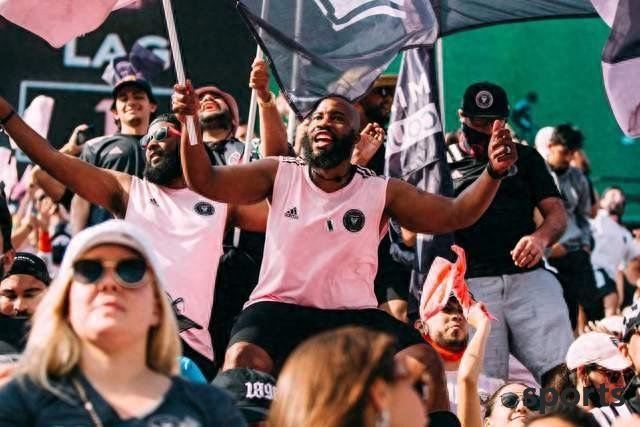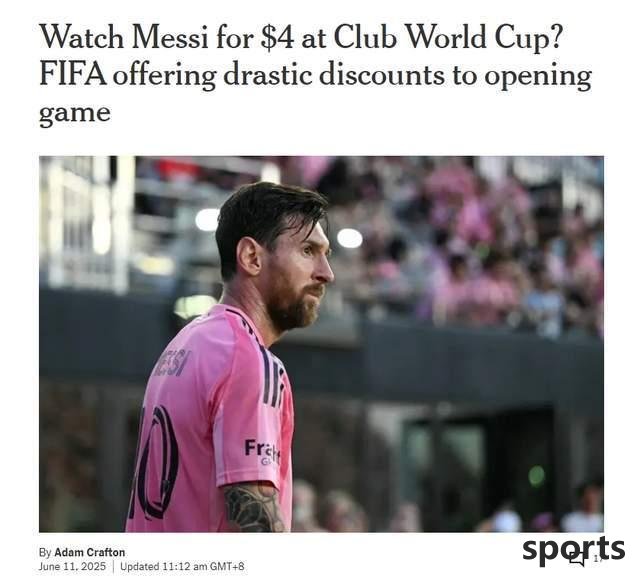QQ-Sports > Football > Messi is at least $4! FIFA sells tickets for the first game of the Club World Cup: Requires 60,000 people to sit for
Messi is at least $4! FIFA sells tickets for the first game of the Club World Cup: Requires 60,000 people to sit for

4 USD to watch Messi! The ticket price of the Club World Cup collapsed, and the Trump ban turned the FIFA feast into a "selling scene"
> The price of a Messi game ticket, less than a cup of Starbucks coffee, FIFA's feast encountered the coldest winter in history.
"Doctor 4 USD" - This is not a community benefit, but the final pricing of tickets for the opening game of the Club World Cup. With only four days left before the game, FIFA sent an emergency email to the 100,000 students at Miami Duade College: Pay $20 to buy a student ticket and get four additional free tickets.
is equivalent to only US$4 per seat (about RMB 28.7) and you can enter the Hard Rock Stadium, which can accommodate 65,000 people to watch the debut of the Club World Cup of the King of Football Messi. Behind this almost desperate promotion is the dilemma of tens of thousands of unsold tickets being piled up.
Although FIFA denied market rumors that "less than 20,000 were sold", insisting that the figures were "much higher", it has always refused to publish specific sales data. The cliff-like decline in ticket prices revealed the truth: the cheapest ticket after the draw in December last year was $349, fell to $230 in January this year, cut to around $110 in May, and fell to $55 by early June.
The cumulative maximum decline is as high as 84%.

01 The cold reality of the feast of the giants
FIFA has placed a heavy bet on this club's World Cup.
The newly restructured Club World Cup brings together 32 top clubs including Real Madrid, Manchester City, Paris Saint-Germain, and has a total prize pool of up to US$1 billion, and is known as the "club version of the World Cup". The event is expected to generate US$2 billion in revenue, with 75% of which rely on broadcast rights and commercial sponsorship.
Business reality poured a pot of cold water.
Just three days before the start of the game, on the official ticketing platform Ticketmaster, there were still a lot of spare tickets in the opening match between Miami International and Egypt's Cairo Nationals, and the cheapest "visual blocked area" seats are priced at $69.15.
This is a spicy contrast to FIFA's initial ambition to position the event as the "highest honor for football in the world".
Tickets for certain games are still strong - the lowest ticket price of Real Madrid against Riyadh Crescent is $231, and the final ticket starts at $753.
Fans voted with their wallets to show that they are not not watching the game, but they are just unwilling to pay for the game that lacks suspense.
Miami International, led by Messi, is located in Group A, except for Palmeiras, Brazil, and other opponents are unable to arouse public interest.

02 The ticket price collapsed, who is wrong?
On the surface, the mistake in ticket sales strategy is the direct fuse.
FIFA adopts a dynamic pricing model, and prices fluctuate with demand, but seriously misjudgment of market demand.
When the initial high-priced tickets were cold, the continuous price cuts intensified the wait-and-see sentiment and formed a vicious cycle.
The deeper crisis comes from the political level.
Just two weeks before the event, the Trump administration suddenly announced a travel ban on 12 countries.
Although the clause states that athletes can be exempted, fans of the banned countries are all blocked from the U.S. goal - this is a disaster for the Club World Cup, which has sold tickets to 130 countries.
The "hesitancy to go to the United States" by international tourists has long been spreading.
Data from the US National Tourism Administration shows that in March this year, tourists to the US decreased by 17% year-on-year, the Caribbean plummeted by 26%, and Central America fell by 24%.
Tourism Economics' emergency correction forecast: from the expected increase in international tourists at the beginning of the year to a decrease of 9.4%.
U.S. Vice President Vance even issued a warning: Visa must leave the country upon expiration, otherwise Homeland Security Secretary Norm will "receive it in person."
When the host country issues an open "threat" to the tourists watching the game, the core values of sports spirit have been cast in shadow.
03 The crack of the money empire
This fare crisis tear opens the crack of FIFA's business territory.
Broadcasting rights sales suffered Waterloo - FIFA had failed to negotiate with 60 European broadcasters and finally reached an agreement worth about $1 billion with DAZN, but was forced to accept a compromise plan for free broadcasting around the world.
This is far from the initial expected business returns.
China's voluntary abandonment of its hosting rights is a critical turning point.
In 2019, FIFA announced that China will hold the 2021 Club World Cup, and eight cities will be selected as host cities.
After the epidemic, the game was reorganized and expanded to 32 teams, but China chose to withdraw, and the United States took over became a helpless choice.
Ironically, this event is still full of Chinese elements: Auckland City's Chinese player Zhou Tong, referees Ma Ning and Fu Ming were selected on the list, Hisense and Lenovo became official partners, and Migu Video received exclusive broadcast rights. The existence of these business highlights precisely highlights the shortcomings of local operations of the event.
04 The moment of fall of sports spirit
Large-scale sports events were once a model for human beings to transcend barriers.
The 2022 Qatar World Cup launched the "Hayya Card" to achieve visa-free viewing; the 2018 Russian World Cup opened its doors through the "FAN ID" policy.
The Trump administration's ban went the other way, making the Club World Cup a victim of the political cold wave.
Outside Miami Hard Rock Stadium, a bigger crisis is fermenting.
Los Angeles has caused conflicts due to immigration raids and imposed a local curfew - the streets of this city where the 2028 Olympic Games are hosted is filled with the pungent smell of tear gas.
Carnival in the stadium and confrontation outside the field form the most rippling picture of contemporary America.
When FIFA sold tickets to college students, it accidentally revealed the cruel truth: the football feast created by a prize of $1 billion can ultimately stand the cold power of a ban. The ideal of "even a deeply divided human community can establish temporary peaceful coexistence under the framework of rules" promised by the sports spirit is fading under the strangle of political reality. The lights at Hard Rock Stadium will eventually illuminate, and Messi's figure will still arouse cheers. The
4 USD ticket may fill the seats, but it cannot fill the FIFA's lost ambitions.
When the U.S. Secretary of Homeland Security threatens that she will "receive" fans of the country if their visa expires? In the next Club World Cup, should we look forward to the peak showdown on Green Field or the blockbuster gap in the audience?
Football has never been so cheap and never been so heavy.
7M SportRelated Posts
Xu Zhengyuan has made an important decision! Wei Shihao s successor has been found in advance and he has been asked to take the lead in Chengdu
FootballA few days ago, Amal Aili, an outstanding forward who came out of Chengdu Football Youth Training, performed well in the game. He performed well in the Valencia U16 League in Spain. Amar Elli scored 4 goals in 6 starts, showing extremely high scorin...
【Football】
moreMa Dexing talks about the national youth: Ukishima Toshi used the "double high" tactic for the first time and underestimated the enemy but was scored by India s counterattack
FootballOctober 11th: The U16 national junior team lost 0-1 to the Indian team in a warm-up match last night. According to Sports Weekly reporter Ma Dexing, the national junior team lost the ball because they underestimated the enemy and were counterattacke...
【Football】
moreAgent: Xiao Yin will never leave Inter Milan if he wins the Champions League. He only went to Saudi Arabia after the disastrous defeat in the final
FootballHupu News on October 11 Recently, Federico Pastorello, the chief agent of the famous economic company P&P Sports Management Company, accepted an interview with the Italian media TMW. He also expressed his views on the transfer situation of his playe...
【Football】
more
Hot Posts
- La Liga latest points report: Real Madrid surpassed Barcelona, Girona won the first victory, Biba won 2-1
- Choi Kang-hee s agent showed up, and she left without giving a high salary. The contract renewal was deadlocked
- Pozeko: Coaching Italy is the best moment in life. No one loves my player more than me
- Trezeguet: Juventus is my life. After being relegated, Juventus allowed me to leave but I didn t leave
- In the Ligue 1 League, Lons vs. Brest, Lons is worried at home, does Brest score away?
- Weekly salary is about 300,000 pounds! British media: Manchester City hopes that the club that rents Gralish will fully bear the salary
- Wang Dalei made a fuss over Wei Shihao and was sent off by the Thai referee, which became the turning point of the game!
- Alonso ordered! Real Madrid plans to sign Manchester City s cornerstone with 100 million euros!
- Alonso s iron-blooded wrist! 6 Ultimatum players, genius and meritorious players can sit on the bench, Real Madrid has changed its days
- Rashford is approaching: Manchester United officially starts sales procedures this summer
Recent Posts
-
talkSPORT: Paratic has agreed to return to Tottenham club and officially take office before October 1
-
Sheringham: Manchester United will be a goal battle against Tottenham, neither team loves to defend
-
May 12, 2025 Football Analysis [Xiaoyu Exclusive]
-
The Club World Cup double hit! Juventus bargaining was rejected, and the buyout fee will rise to 45 million euros
-
The old coach was rarely angry Ranieri: Why did VAR intervene? Passalic obviously encountered Conne
-
Garvey: Paris Saint-Germain wants me? I hope to spend my entire career at Barcelona
-
Hot discussion on Setien s departure: It shows that Guoan still needs some shame; no one can stand the sudden collapse
-
Official: Majorca goalkeeper Grave joins Lyon, with a maximum transfer fee of 5.25 million euros
-
AC Milan is losing money! Let two superstars go away for free, now shines in the Champions League: Lead the team to the finals
-
Djokovic meets Monaco star Zacharia and presents him with a signature jersey